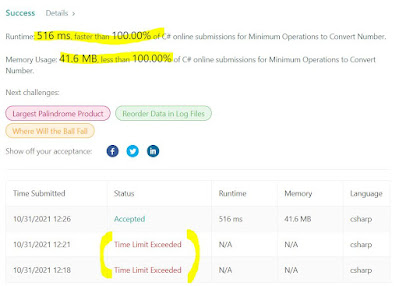BFS in Big-O of 3M steps
You are given a 0-indexed integer array nums containing distinct numbers, an integer start, and an integer goal. There is an integer x that is initially set to start, and you want to perform operations on x such that it is converted to goal. You can perform the following operation repeatedly on the number x:
If 0 <= x <= 1000, then for any index i in the array (0 <= i < nums.length), you can set x to any of the following:
x + nums[i]x - nums[i]x ^ nums[i](bitwise-XOR)
Note that you can use each nums[i] any number of times in any order. Operations that set x to be out of the range 0 <= x <= 1000 are valid, but no more operations can be done afterward.
Return the minimum number of operations needed to convert x = start into goal, and -1 if it is not possible.
Example 1:
Input: nums = [1,3], start = 6, goal = 4 Output: 2 Explanation: We can go from 6 → 7 → 4 with the following 2 operations. - 6 ^ 1 = 7 - 7 ^ 3 = 4
Example 2:
Input: nums = [2,4,12], start = 2, goal = 12 Output: 2 Explanation: We can go from 2 → 14 → 12 with the following 2 operations. - 2 + 12 = 14 - 14 - 2 = 12
Example 3:
Input: nums = [3,5,7], start = 0, goal = -4 Output: 2 Explanation: We can go from 0 → 3 → -4 with the following 2 operations. - 0 + 3 = 3 - 3 - 7 = -4 Note that the last operation sets x out of the range 0 <= x <= 1000, which is valid.
Example 4:
Input: nums = [2,8,16], start = 0, goal = 1 Output: -1 Explanation: There is no way to convert 0 into 1.
Example 5:
Input: nums = [1], start = 0, goal = 3 Output: 3 Explanation: We can go from 0 → 1 → 2 → 3 with the following 3 operations. - 0 + 1 = 1 - 1 + 1 = 2 - 2 + 1 = 3
Constraints:
1 <= nums.length <= 1000-109 <= nums[i], goal <= 1090 <= start <= 1000start != goal- All the integers in
numsare distinct.
public class NumQueueItem
{
public long n = 0;
public int numberOfSteps = 0;
public NumQueueItem(long n, int numberOfSteps)
{
this.n = n;
this.numberOfSteps = numberOfSteps;
}
}
public int MinimumOperations(int[] nums, int start, int goal)
{
Queue queue = new Queue();
Hashtable visited = new Hashtable();
NumQueueItem qi = new NumQueueItem((long)start, 0);
queue.Enqueue(qi);
visited.Add(qi.n, true);
while (queue.Count > 0) //O(1000)
{
NumQueueItem cqi = queue.Dequeue();
if ((int)cqi.n == goal) return cqi.numberOfSteps;
for (int i = 0; i < nums.Length; i++) //O(1000)
{
long[] candidates = { cqi.n + nums[i], cqi.n - nums[i], cqi.n ^ nums[i] };
foreach (long candidate in candidates) //O(3)
{
if (!visited.ContainsKey(candidate))
{
if ((int)candidate == goal)
{
return cqi.numberOfSteps + 1;
}
else if (candidate >= 0 && candidate <= 1000)
{
NumQueueItem nqi = new NumQueueItem(candidate, cqi.numberOfSteps + 1);
queue.Enqueue(nqi);
visited.Add(nqi.n, true);
}
}
}
}
}
return -1;
}




Comments
Post a Comment